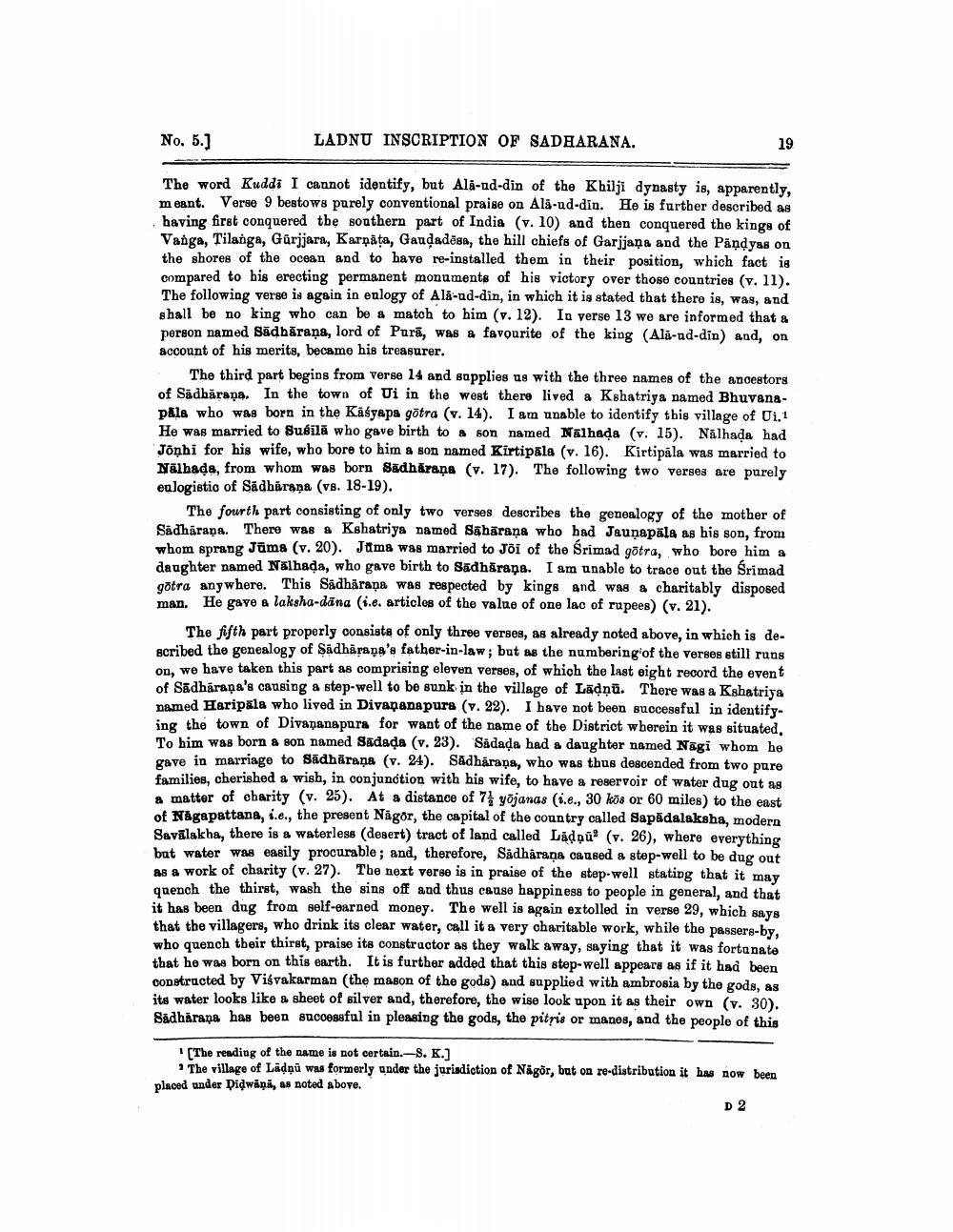________________
No. 5.)
LADNU INSCRIPTION OF SADHARANA.
19
The word Kuddi I cannot identify, but Ala-ud-din of the Khilji dynasty is, apparently, meant. Verse 9 bestows purely conventional praise on Alå-ud-din. He is further described as having first conquered the southern part of India (v. 10) and then conquered the kings of Vanga, Tilanga, Gürjjara, Karnāta, Gaudadēga, the hill chiefs of Garijana and the Pandyas on the shores of the ocean and to have re-installed them in their position, which fact is compared to his erecting permanent monuments of his victory over those countries (v. 11). The following verse is again in eulogy of Ala-ud-din, in which it is stated that there is, was, and shall be no king who can be & match to him (v. 12). In verse 13 we are informed that & person named Sädhāraņa, lord of Purā, was a favourite of the king (Ali-ud-din) and, on account of his merits, became his treasurer.
The third part begins from verse 14 and supplies us with the three names of the ancestors of Sädhärapa. In the town of Ui in the west there lived & Kshatriya named Bhuvanapäls who was born in the Kaśyapa götra (v. 14). I am unable to identify this village of Ui, 1 He was married to Susilā who gave birth to a son named Nalhada (v. 15). Nálhada had Jonhi for his wife, who bore to him a son named Kirtipala (v. 16). Kirtipāla was married to Nälhada, from whom was born Sadhāraņa (v. 17). The following two verses are purely eulogistic of Sadhurana (vs. 18-19).
The fourth part consisting of only two verses describes the genealogy of the mother of Sadhāraṇa. There was a Kshatriya named Sāhāraṇa who had Jaunapala as his son, from whom sprang Jums (v. 20). Juma was married to Joi of the Srimad götra, who bore him a daughter named Nálhada, who gave birth to Sadhārana. I am unable to trace out the Srimad gotra anywhere. This Sadhāraṇa was respected by kings and was & charitably disposed man. He gave a laksha-dana (i.e. articles of the value of one lac of rupees) (v. 21).
The fifth part properly consists of only three verses, as already noted above, in which is described the genealogy of Sadhārapa's father-in-law; but as the numbering of the verses still rung on, we have taken this part as comprising eleven verses, of which the last eight record the event of Sadharaṇa's causing a step-well to be sunk in the village of Ladņu. There was a Kshatriya named Haripala who lived in Divananapura (v. 22). I have not been successful in identifying the town of Divananapura for want of the name of the District wherein it was situated. To him was born a son named Sadada (v. 23). Sådada had a daughter named Nagi whom he gave in marriage to Sädhäraņa (v. 24). Sadharana, who was thus descended from two pure families, cherished a wish, in conjunction with his wife, to have a reservoir of water dug out as a matter of charity (v. 25). At a distance of 7 yojanas (i.e., 30 kos or 60 miles) to the east of Någapattana, s.e., the present Nägor, the capital of the country called Sapädalaksha, modern Savālakha, there is a waterless (desert) tract of land called Ladəū® (v. 26), where everything but water was easily procurable; and, therefore, Sadharana caused a step-well to be dug out as a work of charity (v. 27). The next verse is in praise of the step-well stating that it may quench the thirst, wash the sins off and thus cause happiness to people in general, and that it has been dng from self-earned money. The well is again extolled in verse 29, which says that the villagers, who drink its clear water, call it a very charitable work, while the passers-by, who quench their thirst, praise its constructor as they walk away, saying that it was forta nate that he was born on this earth. It is further added that this step-well appears as if it had been constructed by Visvakarman (the mason of the gods) and supplied with ambrosia by the gods, as its water looks like a sheet of silver and, therefore, the wise look upon it as their own (v. 30). Sadharana has been successful in pleasing the gods, the pitris or manes, and the people of this
The reading of the name is not certain.-S. K.] 1 The village of Ladņū was formerly under the jurisdiction of Någor, but on re-distribution it has now been placed under Didwapi, as noted above.




